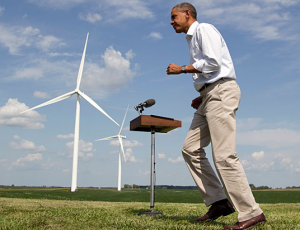Five Important U.S. Energy Stories Of 2012
 The presidential and congressional elections dominated the American news cycle in 2012. And although climate change took a backseat during the campaign, energy played a surprisingly prominent role.
The presidential and congressional elections dominated the American news cycle in 2012. And although climate change took a backseat during the campaign, energy played a surprisingly prominent role.The news cycle was dominated by energy: Republican presidential candidate Mitt Romney made fossil fuel extraction his number one priority; fossil fuel interests spent hundreds of millions of dollars to promote oil, coal, and gas during the election; and President Obama busily defended his promotion of renewable energy after getting attacked by the fossil fuel lobby.
Looking back at 2012, here are some of the most important energy stories of the year:
Fact Check: In 36 Years Of Data, Not A Shred Of Evidence That Drilling Reduces Gas Prices
In March, the press analyzed more than 30 years of gas price and domestic drilling data. It found absolutely no correlation between increased domestic drilling and lower prices for consumers. Why? Because oil is a global market and U.S. production represents a small portion of global demand.
This was a particularly important story in 2012. Throughout the election season, the fossil fuel lobby and proponents of “drill-baby-drill” pushed a plan for unchecked fossil fuel development, falsely claiming it would lower gas prices. Experience proved otherwise. Even though the U.S. is producing more oil than at any point since the mid 1990’s, gas prices have remained “stubbornly high.”
Big Polluters Spend $270 Million In Final Months Of 2012 Elections
Fossil fuel interests spent unprecedented amounts of money this election season. In the last two months of the campaign, groups promoting fossil fuels spent $270 million on television ads to influence the presidential, House, and Senate races. From April to November, these groups spent $265.9 million on the presidential campaign alone, according to a Center for American Progress Action Fund analysis.
But the lavish spending didn’t work. Despite spending record amounts of money, polluter groups failed to change the presidency, failed to change the balance of power in Congress, and failed to give Republicans the important coal states of Ohio, Pennsylvania, and Virginia.
Environmental Groups Celebrate A Political Victory: ‘Knock, Baby, Knock’ Beat ‘Drill, Baby, Drill’
Judging by pure spending, the 2012 election wasn’t looking good for environmentalists. Polluter groups outspent environmental groups 4-1, making it seem like the momentum was on their side. But the results showed otherwise: Four out of the “flat earth five” climate deniers in the House lost their races; Seven of eight Senate candidates supported by environmental groups won their races, thus preventing Republicans from taking the Senate and cutting off the drumbeat of anti-environmental legislation in the House; 11 of the 12 “Climate Heroes” promoted by environmentalists won their races; and the President kept his job.
While gridlock will likely define Obama’s second term, environmental advocates said the 2012 elections proved their strength: “We went head to head with the likes of Crossroads and Karl Rove,” said Jamie Rappaport Clark, president of Defenders of Wildlife, after the elections.
Shell’s Woes In The Arctic Underscore Challenges In The Region
The Arctic is shedding ice at an alarming rate due to global warming. The response? Oil companies want to use the opportunity to look for more offshore oil and gas that will only accelerate warming. In 2012, Shell became the first company to drill exploratory wells in U.S. Arctic waters, raising concerns about the local and global environmental impact. (For more on this, check out the great documentary produced by the Center for American Progress oceans team).
Shell’s troubles throughout the year proved just how tough it is to drill in the region. From crushing its oil containment unit “like a beer can” to losing control of its drilling rig, the company faced numerous challenges. And major organizations responded. In April, insurance giant Lloyd’s of London warned that responding to an oil spill in a region that is “highly sensitive to damage” would present “multiple obstacles, which together constitute a unique and hard-to-manage risk”; German bank WestLB announced it would not finance offshore oil or gas drilling in the Arctic, saying the “risks and costs are simply too high”; and Total SA, the fourth largest publicly traded oil and gas company in the world, said drilling in the region could be a “disaster.”
Renewable Electricity Nearly Doubles Under Obama
President Obama was attacked hard in 2012 for his promotion of renewable energy, green jobs, and environmental regulations. Many opponents claimed that stimulus investments in renewables didn’t work. But the figures told otherwise.
According to figures from the Energy Information Administration, non-hydro renewable electricity generation has nearly doubled since Obama took office, reaching 5.75 percent of net electricity. In 2008, before Obama entered the White House, non-hydro resources like solar, wind, geothermal, and biomass represented just over 3 percent of generation. While political uncertainty has made 2013 prospects for renewables uncertain, the U.S. has still maintained a strong role in the global market. Since 2004, one trillion dollars have been invested in the global clean energy sector, with a large portion of that coming from the American private and public sectors.
This is just a small selection of the many important stories throughout the year.
You can return to the main Market News page, or press the Back button on your browser.

